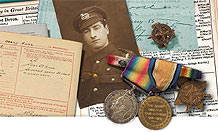Family History Tips
Handy question sheets and charts
Guides and tips
Tips
We have some really keen family historians on Genes Reunited and we have asked them for their tips for people just starting to research their family history. Here are the top 20 which we hope you find useful:
- Talk to as many living relatives as you can and write down everything they tell you.
- Ask your relatives for any photos, documents or letters they may have which could hold some useful clues to your family history.
- Start by adding your own name to your tree and then the names of the relatives you already know.
- Always check your facts and remember no information is correct until proven otherwise.
- Sign up for our Hot Matches email. We will email you every few weeks with matches with names in your tree. The more names you add the more matches you'll get.
- Remember that names do change over the years so look for variations of a surname.
- Some relatives may have used their middle name rather than their given name. Bear that in mind when searching for someone.
- Don't jump to conclusions. Remember that 1+1 doesn't always = 2.
- Google the names of your relatives. You may find some useful links.
- Join a relevant local Family History society.
- Back your tree up. You can export from Genes Reunited and save it as a gedcom on your PC or external hard drive. Or, simply write it all down!
- If you are stuck go to our Community Section and ask for help from our members. We have some really knowledgeable people who enjoy helping others with their brick walls.
- Couples didn't always marry so you may not necessarily find details of their marriage.
- Be prepared to spend money on certificates from the General Register Office. They can be a wealth of information and will help you go further back with your tree.
- The census isn't always accurate. The ages may well be wrong, so search several years either side of the year of birth for your relative. In the 1841 census ages were rounded down to the nearest 5 years.
- Read the census returns carefully. You may find nephews, nieces and in-laws. These can give you clues to other surnames.
- Re-visit your research. Go over old certificates and old notes. You might spot something you've not seen before or a note may jog your memory.
- Come along to our Ask An Expert session on the second Tuesday of every month at 9pm. Chat with our resident genealogist Anthony Adolph.
- Don't trust family stories, but don't dismiss them. You may be told a relative was the Mayor of London, only to find out he wasn't but he was the mayor of your home town.
- Write a to-do list so that you have a note of which branch you need to research or records you need to check.

